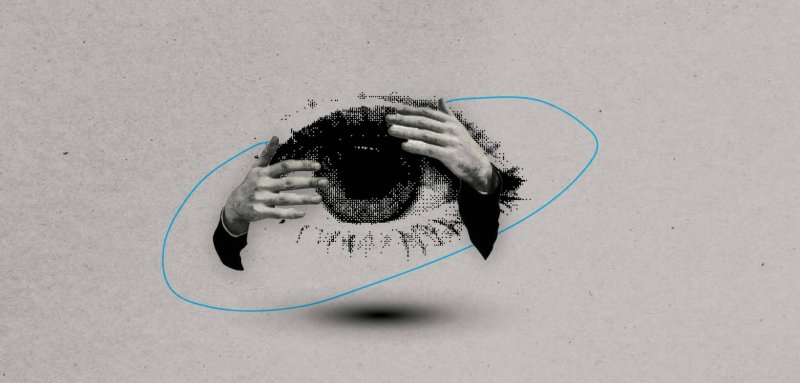Scene #1: Beirut — To a Sunny Country
Coffee with friends: We are working together at a coffee shop, and they research work visas abroad during their breaks.
“Spain! It may be the best place to immigrate. It’s similar to Lebanon; its people are joyful, and the climate suits us. We can start fresh, build a new routine away from here. It might not offer many work options, but there’s a digital nomad visa available. We can live there, then visit Lebanon when things calm down.”
I listen quietly and continue my work, all of us afraid of another strike near us as we desperately search for a way out.
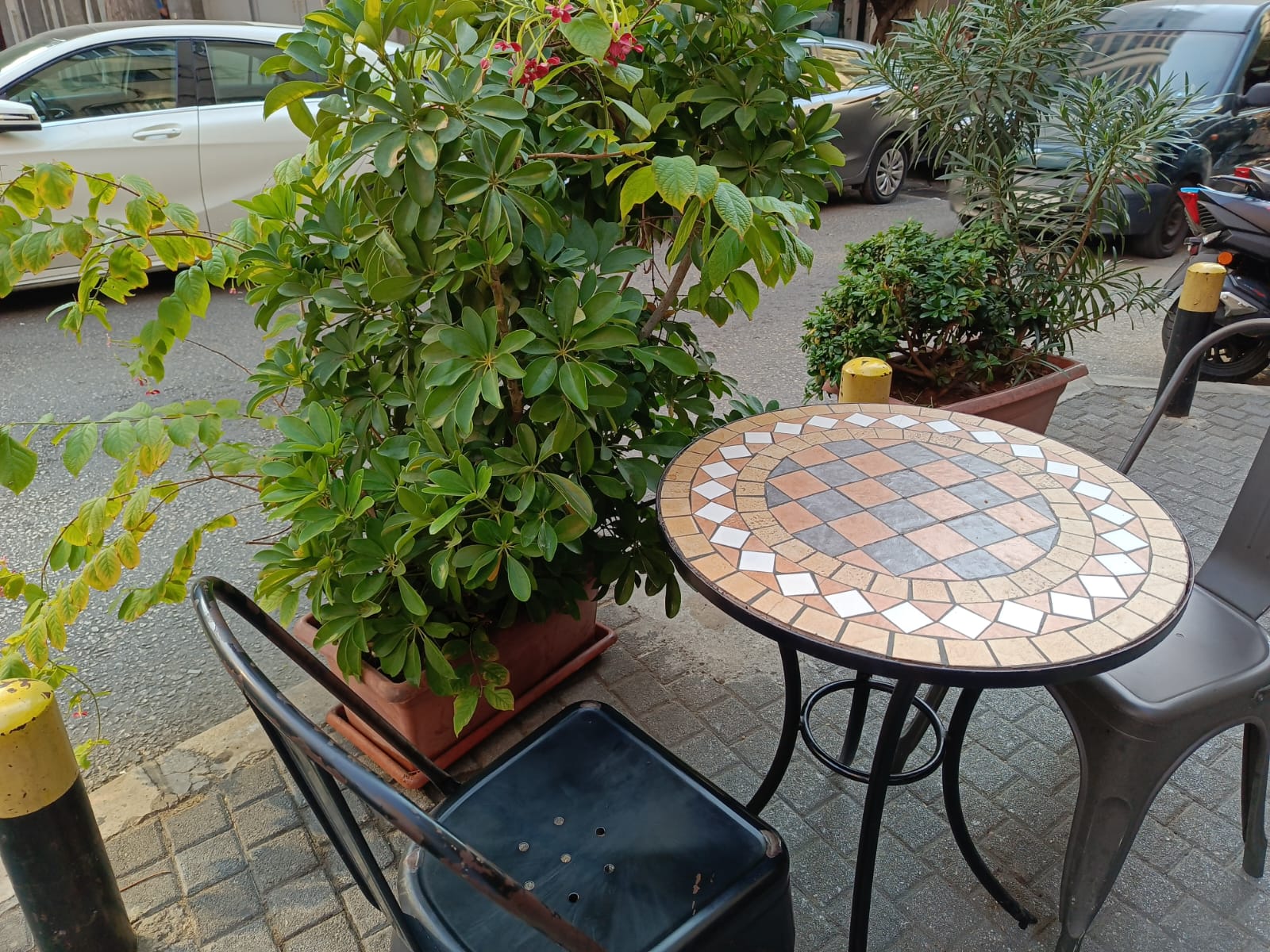 A table and two chairs at café Raseef in Beirut.
A table and two chairs at café Raseef in Beirut.
When I walk through the paradoxical city of Beirut, I reflect: everyone has to start from scratch and endure solitude. Everyone has to fight to their last breath for the little that remains of life just to secure their basic needs. Everyone cries at night or lies sleepless in bed. Everyone’s home spits them out, and the world slams its doors in their faces.
Scene #2: Paris — We Stay in Paris
Meeting my best friend in Paris: We share a reunion drink after one year apart. She left Lebanon because she felt the country had already rejected her.
“Come live in Europe. We’ll live close to each other and see each other at least three times a year. At the very least, we can ease the pain of living in Beirut on ourselves, and you’ll build a good future here.”
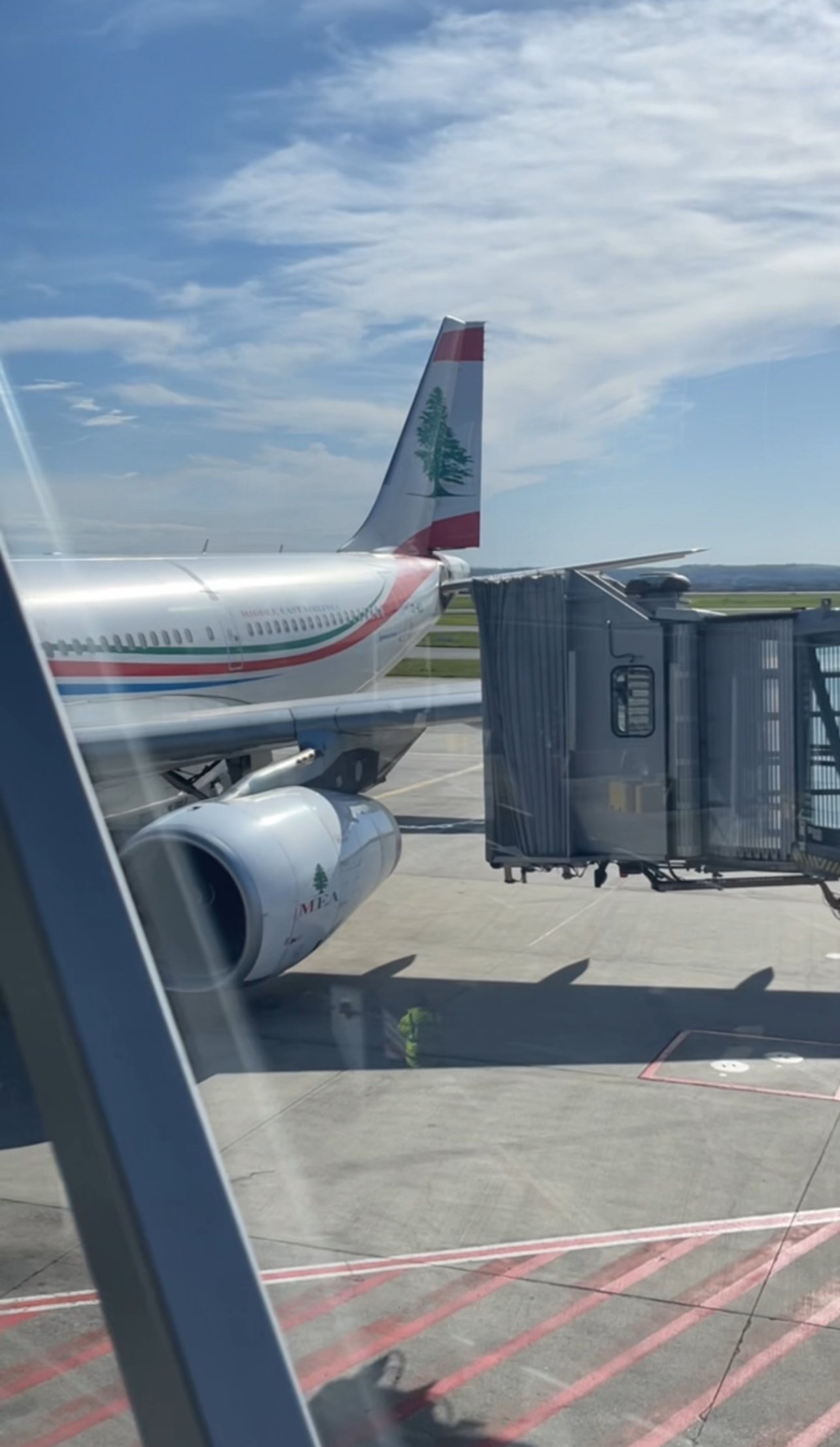 A Lebanese commercial airplane at the airport
A Lebanese commercial airplane at the airport
I say I’ll think about it and fly back home.
Amidst the sorrow I hold in the plane as it lands near Beirut’s bombed-out areas, I find joy in knowing my friend escaped this deadly place—as if surviving and leaving Beirut is an achievement in itself. I reassure myself that I’ll leave soon, too, very soon. Somehow, my friends eased the pain by leaving all at once.
Scene #3: The Bekaa Valley — To Romania
A gathering with friends: We had been planning to attend their wedding this coming summer. Instead, we held a modest celebration for my friend’s sudden and rushed marriage, and discussed her future plans to migrate with her husband to Romania.
“We could create a simple life there, maybe start a small business and make a living, and visit each other if you ever come to Europe.”
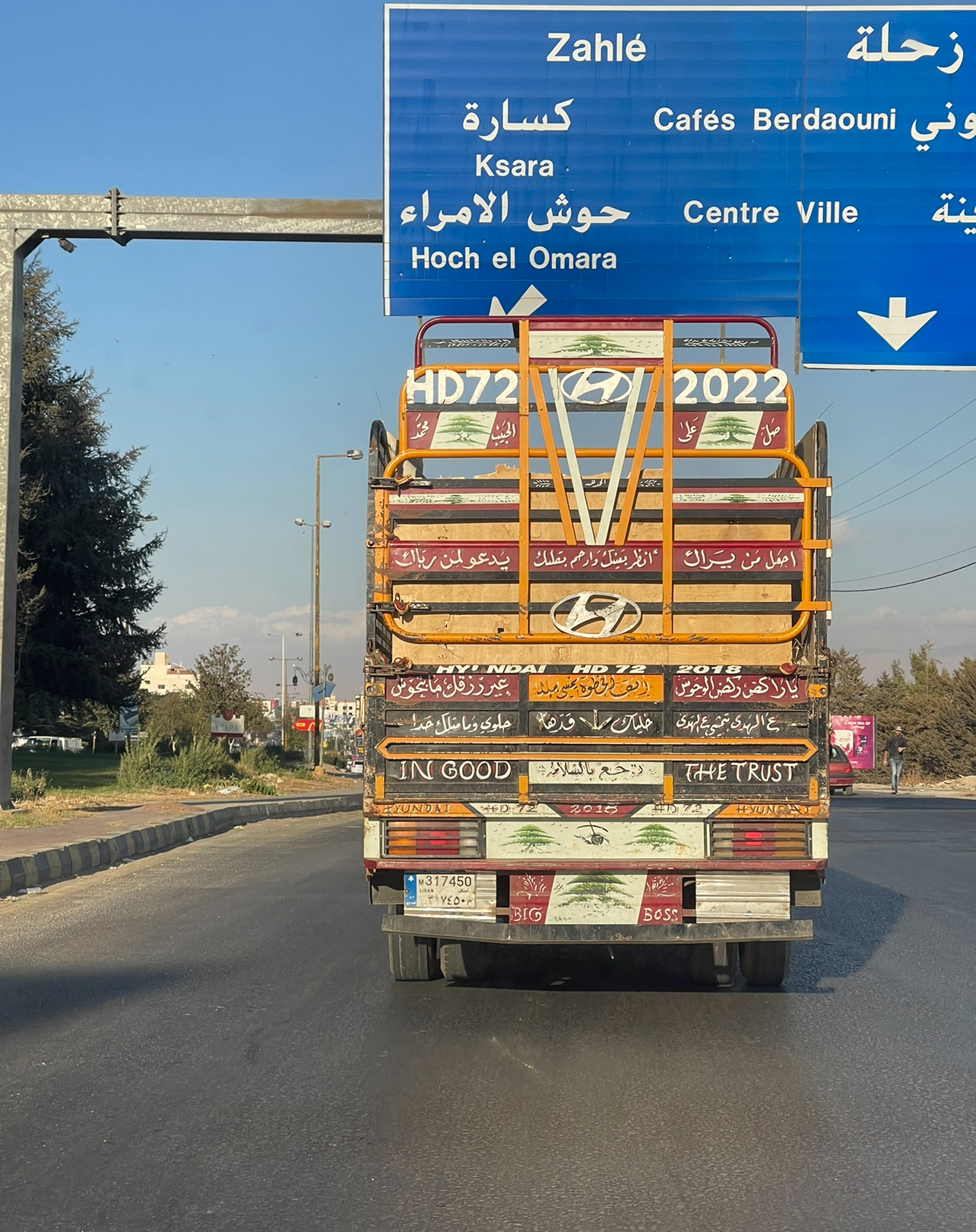 A truck on a highway in Lebanon
A truck on a highway in Lebanon
I feel a renewed sense of joy that she also survived and found a plan that suits her. I drive back to Beirut on the Dahr al-Baydar road, connecting Bekaa to Beirut, which Israel regularly targets. I feel strangely confident that Israeli drones won’t strike my car tonight.
She’s the only friend who insists on staying in Lebanon, despite the countless traumas we share in Beirut. “Where would I go?” she asks. “Tell me. Where can I find a sea as beautiful as ours, and a sun that appears as often as ours?” She can’t imagine a life without visiting the sea every week. From her, I draw a bit of hope and self-consolation for those who remain here. She truly believes everything will pass, just as it did for our parents and grandparents.
Scene #4: Beirut — To anywhere else
A meeting with my friend: He’s reassured to hear that I returned safely to Beirut. We're the only ones left here; our mutual friends either temporarily left the city or left Lebanon entirely. He also briefly escaped Beirut before returning.
“I came back to Beirut for a bit. I hear the bombing more here, but I feel more comfortable in my own home. We should leave this country by next year at the most. I can go and study anywhere. I want to get away from this deadly place. We need to leave before another crisis hits soon.”
I nod. “Of course! We’ll leave soon, inshAllah. Try applying to any country.”
My friend continues his search for affordable universities, as it’s the only way he can leave without having to convince companies abroad to accept, “sponsor,” and grant him a work visa, even though he’s one of the most talented people I know.
I carry the weight of the conversation for a long time.
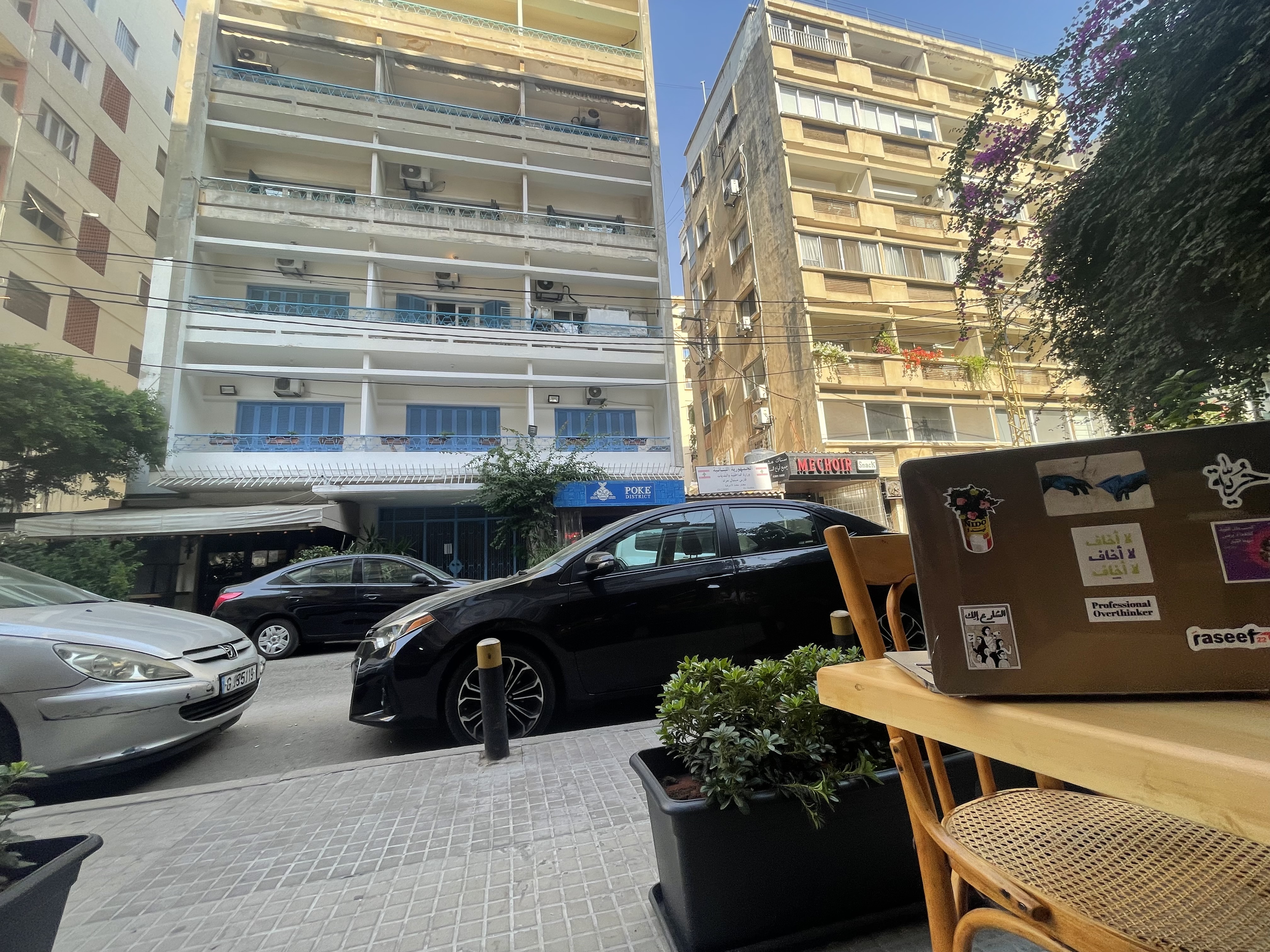 Buildings in the capital Beirut
Buildings in the capital Beirut
I, too, get frustrated every day when I see the disclaimer that “it is a requirement to have a work permit for the country indicated” at the end of every job posting abroad, yet they’ve written elsewhere that they don’t discriminate based on ethnicity, color, gender, or nationality.
I laugh and press “Cancel Application.”
Everyone has to prove that they are human, worthy of living and working with dignity. Everyone has the right to choose the country they want to live in. We shouldn’t have to say goodbye to our homes or our grandparents’ homes in the Bekaa, the South, or Beirut.
We deserve tenderness, gentleness, and ease. We shouldn’t be trembling with fear whenever we hear an unusual sound.
Scene #5: Beirut — To the unknown
A visit to the tents of the displaced in Beirut: These are the people who had to quickly bid farewell to their warm homes and leave in the dark of night.
"We no longer have a place to go. We were forced to leave our house in the South. It was a lovely home. We couldn’t find a place to go to. We're sad and weary, and we’ve been through a lot, but God willing, we will return,” the woman sitting before me says.
This resilient, iron lady holds on to the hope of returning to her home in the South. She doesn’t know when she’ll return but she knows that she will soon be back in the comfort of her home. She offers us some Lebanese coffee and apologizes for the simplicity of her tent. We thank her and leave.
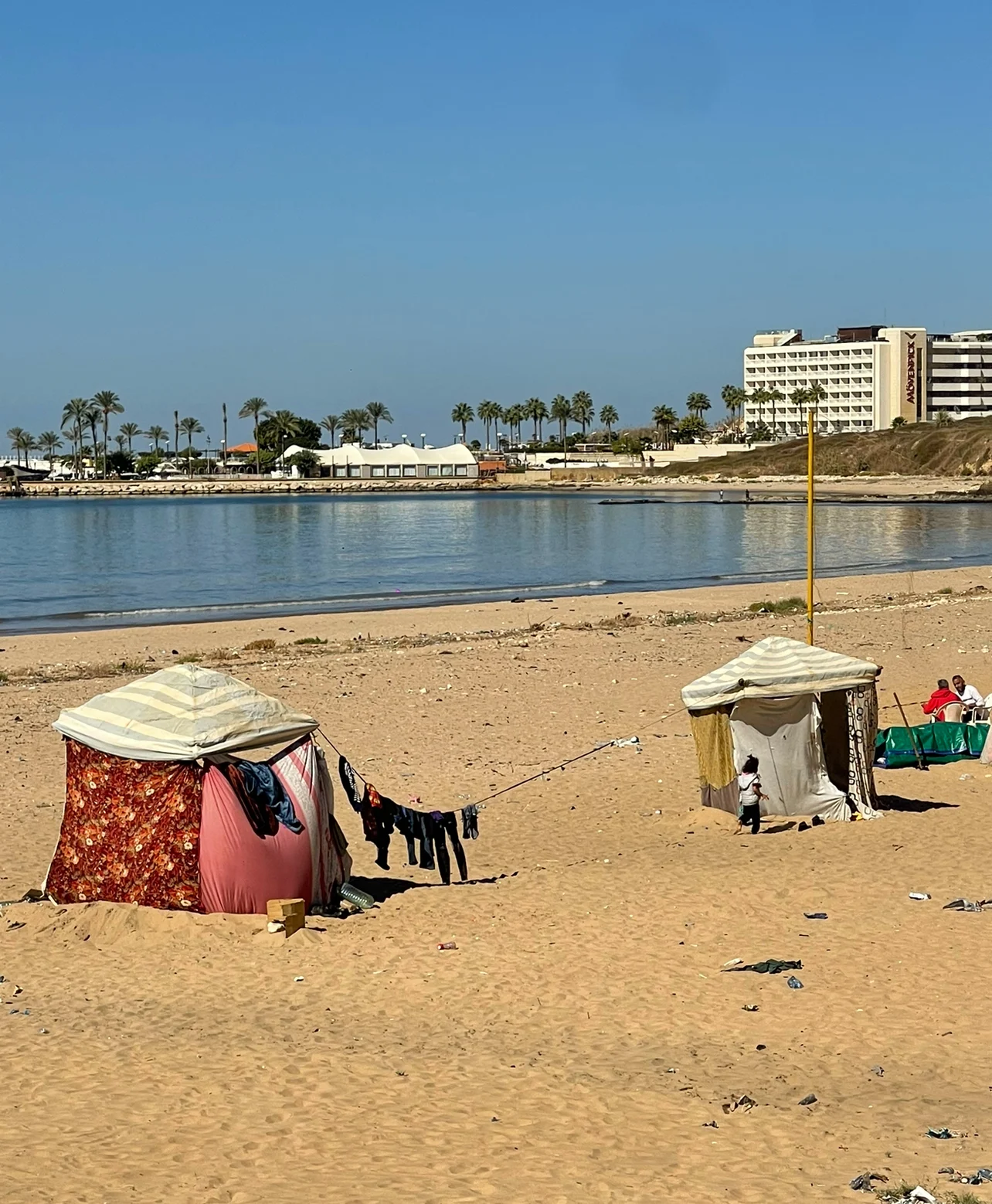 The tents of the displaced on the beaches of Beirut
The tents of the displaced on the beaches of Beirut
I carry the weight of her deep sorrow and her remarkable pride for a long time. I curl around myself in shame. I don’t know how I can ease even a fraction of her pain or bring her a bit of calm and peace.
“We're sad and weary, and we’ve been through a lot, but God willing, we will return,” the woman sitting before me says. This resilient, iron lady holds on to the hope of returning to her home in the South. She doesn’t know when she’ll return but she knows that she will soon be back in the comfort of her home. She offers us some Lebanese coffee and apologizes for the simplicity of her tent. When we leave, I carry the weight of her deep sorrow and her remarkable pride for a long time. I don’t know how I can ease even a fraction of her pain.
I return and shower with guilt inside the comfort of my home. I hide from my own helplessness, from the repetitive patterns of tragedy in this country.
I feel guilty about sleeping in my bed, the fact that I still have one, and I fear its sudden disappearance at any moment, while Israel strikes buildings indiscriminately every day. Who knows what, or who, they will target tomorrow.
Scene #6: The Bekaa Valley — To a land on the other side of the world
This is the hardest scene, and it takes place in the Bekaa Valley, which Israel also indiscriminately bombs on a regular basis. We sit on the balcony with my friend, her husband, and my mother; it’s our last gathering before they leave for a faraway country for an unknown period of time.
“We don’t have any other options. We have to start from scratch over there and try to build something new. Every attempt to build a career fails here. We wanted to have a child here, to grow old with them in this country, but the government stole all our money. Every time we attempt to create a life here, another disaster strikes.”
This is how they explain their sudden decision to leave to my mother, who remarks that they probably won’t return anytime soon, just as her own relatives left during the Lebanese Civil War and never came back.
How do I get through my days without the promise of seeing my friends and loved ones after an exhausting week at work? How can a newborn, so dear to my heart, grow up so far away from me? My niece also lives far from home. Why is she learning something new every day, so far from us? She’s growing up peacefully, away from the terrifying sounds of airstrikes. At least I don’t have to worry about her enduring the trauma of this war.
We hope our children will become close friends as effortlessly as we did. We hope they won’t resent visiting “mom’s best friend” who lives far away, or having to hang out with her children.
We light up the “good night cigarette,” a term my friend’s husband uses each time their visit comes to an end—but tonight, it’s different. We know it’s the last one, so we let it burn a bit longer, until it's completely gone. We don’t want to put it out.
The cigarette burns out, and we say our goodbyes at the door. My mother urges them to return with a child next time, a request she makes every time she sees them. Usually they laugh, replying, “how would we raise kids in this weary country? Give us a break!”
This time, they don’t laugh. My mother cries as she repeats her usual wish, remembering how those who left to a faraway place never came back. They promise her two children when they return. They cry, and we cry. We cry a lot these days.
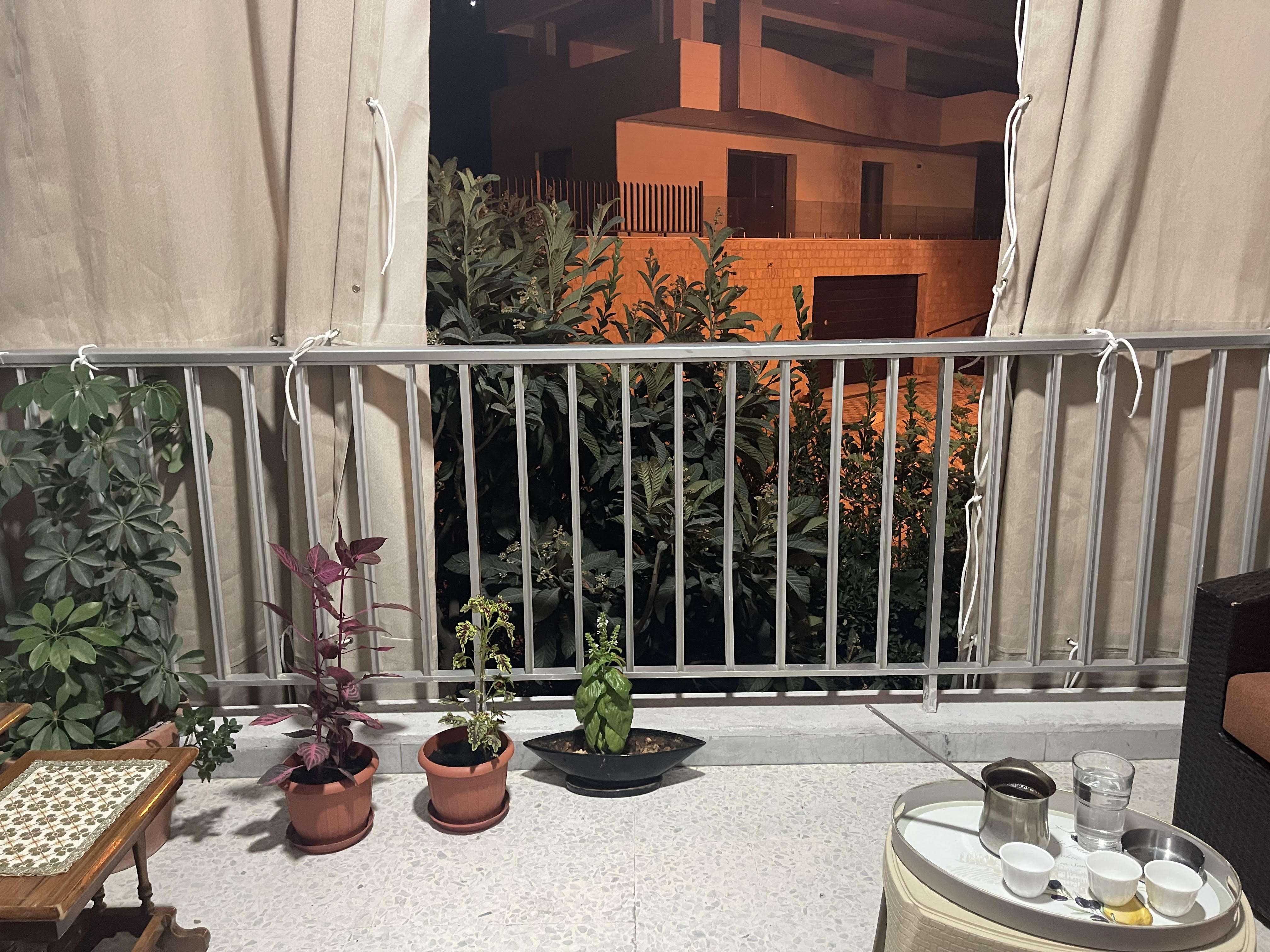 A balcony in a house in Lebanon
A balcony in a house in Lebanon
She's been my closest friend since our school days. Every time I see her, I feel like I’m home. We sit together, always drifting to memories of our school mischief, and we laugh. We laugh a lot. She’s the one who makes me laugh the most.
How do I survive without visiting my friends once a week? How do I get through my days without the promise of seeing my friends and loved ones after an exhausting week at work? How can a newborn, so dear to my heart, grow up so far away from me?
My niece also lives far from home. Why is she learning something new every day, so far from us? She’s growing up peacefully, away from the terrifying sounds of airstrikes.
At least I don’t have to worry about her enduring the trauma of this war.
Scene #7: Beirut — To nowhere
She’s the only friend who insists on staying in Lebanon, despite the countless traumas we share in Beirut.
“Where would I go?” she repeats. “Tell me. Where can I find a sea as beautiful as ours, and a sun that appears as often as ours?”
Even though all her friends have left, she chooses to stay here. She can’t imagine a life without visiting the sea every week, even though she cannot even enjoy it anymore.
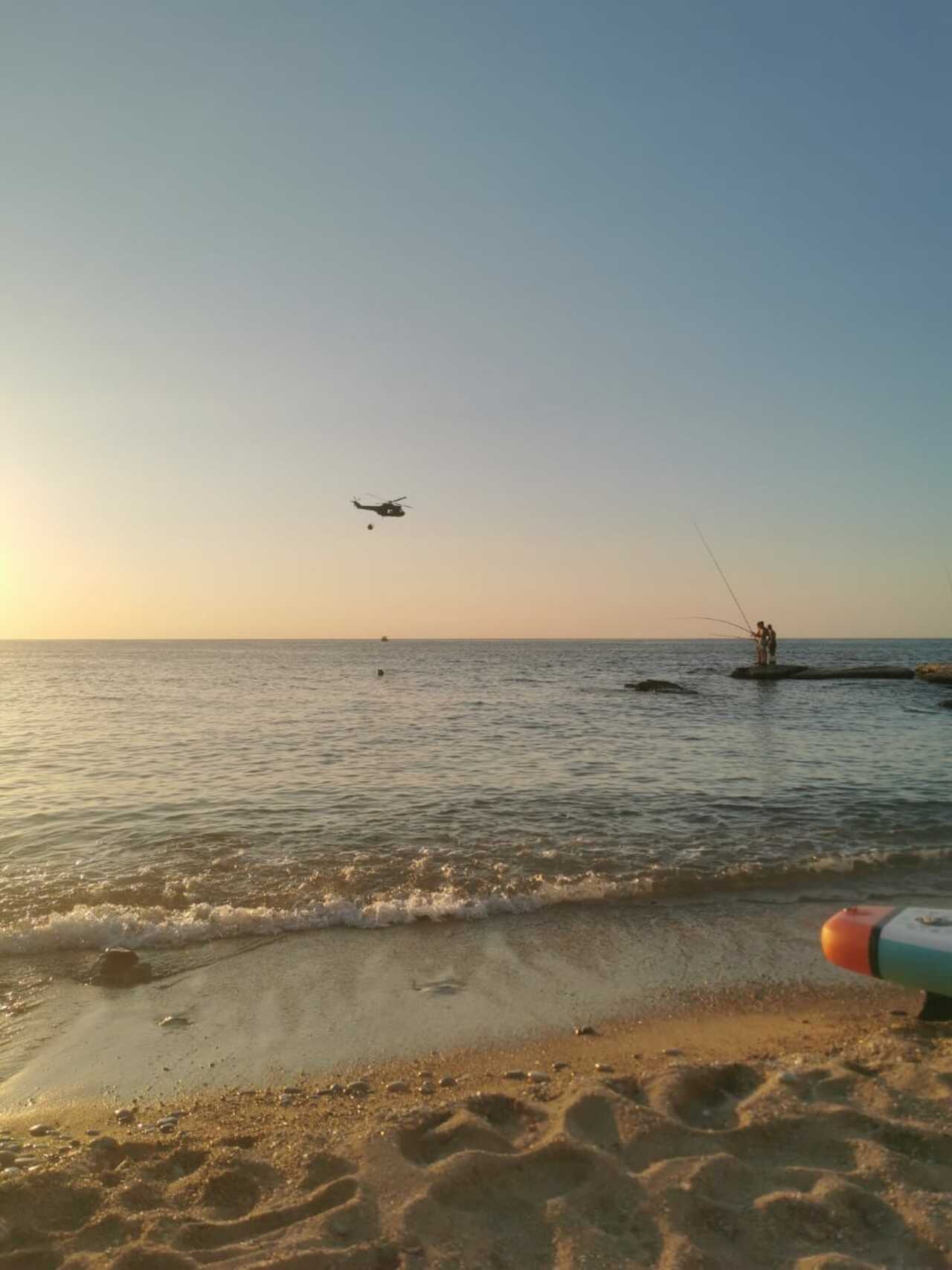 A beach and a helicopter.
A beach and a helicopter.
From her, I draw a bit of hope and self-consolation for those who remain here. She truly believes everything will pass, just as it did for our parents and grandparents.
The final act: Beirut — To somewhere nearby
I head home after that last cigarette with my friend and her husband. I lit my own and let out the tears I couldn’t share with everyone else.
I write them a few nice messages, and share our pictures on the silly and meaningless Instagram platform. A lame attempt to express something. I write a lot, but I never say I’m sad because I won’t see them anytime soon.
Inside me, there’s a conflicting mix of anger and surrender. I’m angry for those whose homes have been emptied, whose villages and towns in the South, the Bekaa, and across Lebanon have been completely destroyed. I weep at these repeated scenes of escape, at our helplessness in controlling anything here.
The next day, I walk through Beirut. It’s empty.
The streets of Beirut now lack their warmth, comfort, and spontaneous gatherings. There are fewer welcoming homes, fewer minds at ease. The loud buzz of the drone accompanies me wherever I go. My friends won’t hear this sound abroad. They won’t be startled by fireworks or flinch at Israeli warplanes ripping through the sound barrier. They won’t feel this sense of complete helplessness, like the world around them is shrouded in a constant cloud of anxiety.
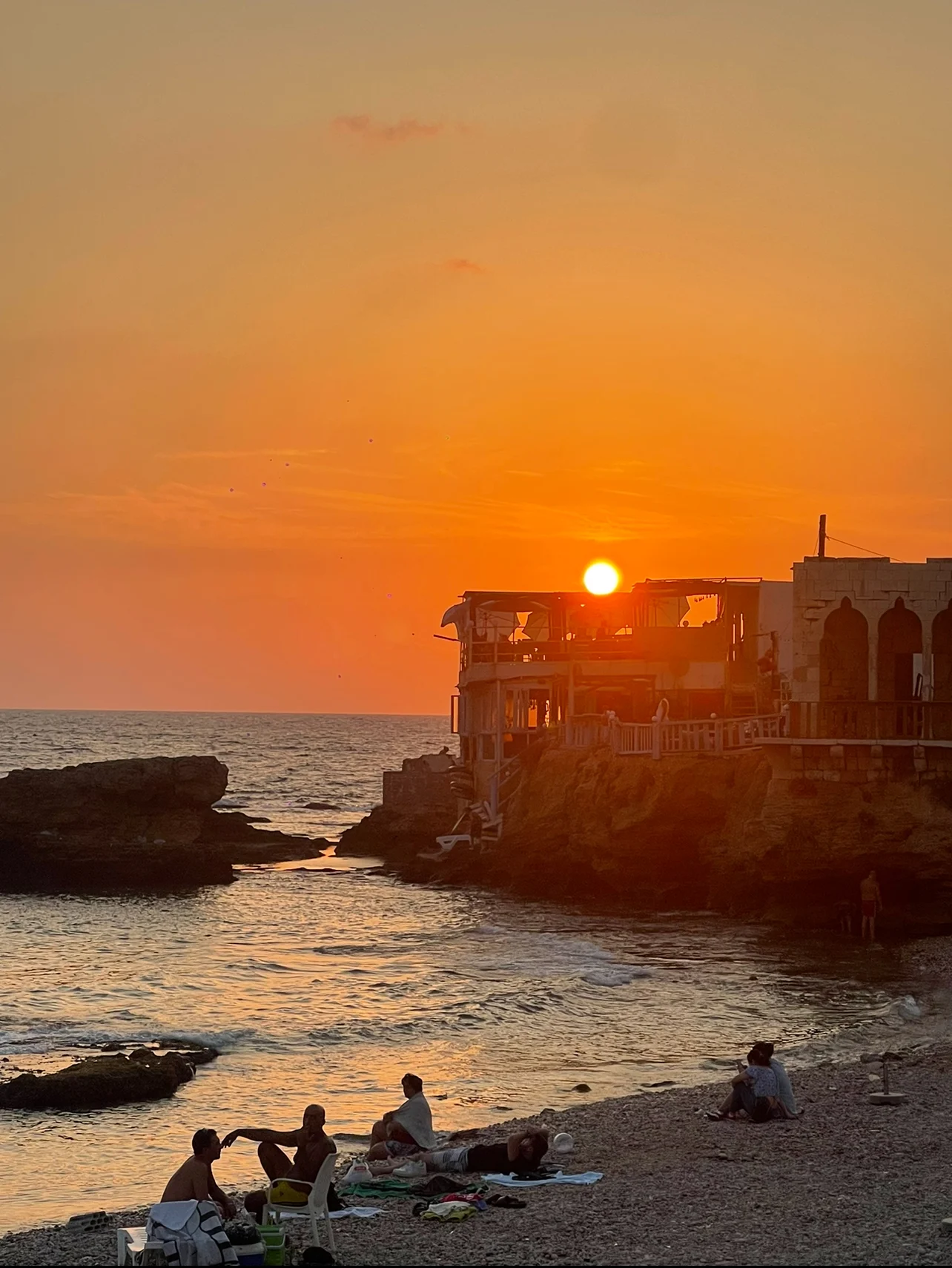 People at the beach
People at the beach
I watched all these scenes of departure in just one week. I won’t see my friends’ dreams come true. I am terrified by the thought of not seeing them whenever I miss them. One of the beautiful things about this country is that we can see our friends whenever we want to; everybody is at least 10 minutes away, or an hour at most, and they’re always around, prioritizing time for each other.
But now, everyone feels lost.
Inside me, there’s a conflicting mix of anger and surrender. I’m angry for those whose homes have been emptied, whose villages and towns in the South, the Bekaa, and across Lebanon have been completely destroyed. I weep at these repeated scenes of escape, at our helplessness in controlling anything here.
If we don't leave, we’ll have to go through this all over again with our children someday. I know that this country will always weigh heavily on our minds and hearts, even if we move to a quieter place, but I comfort myself: maybe this will be less painful when the body is far from the land.
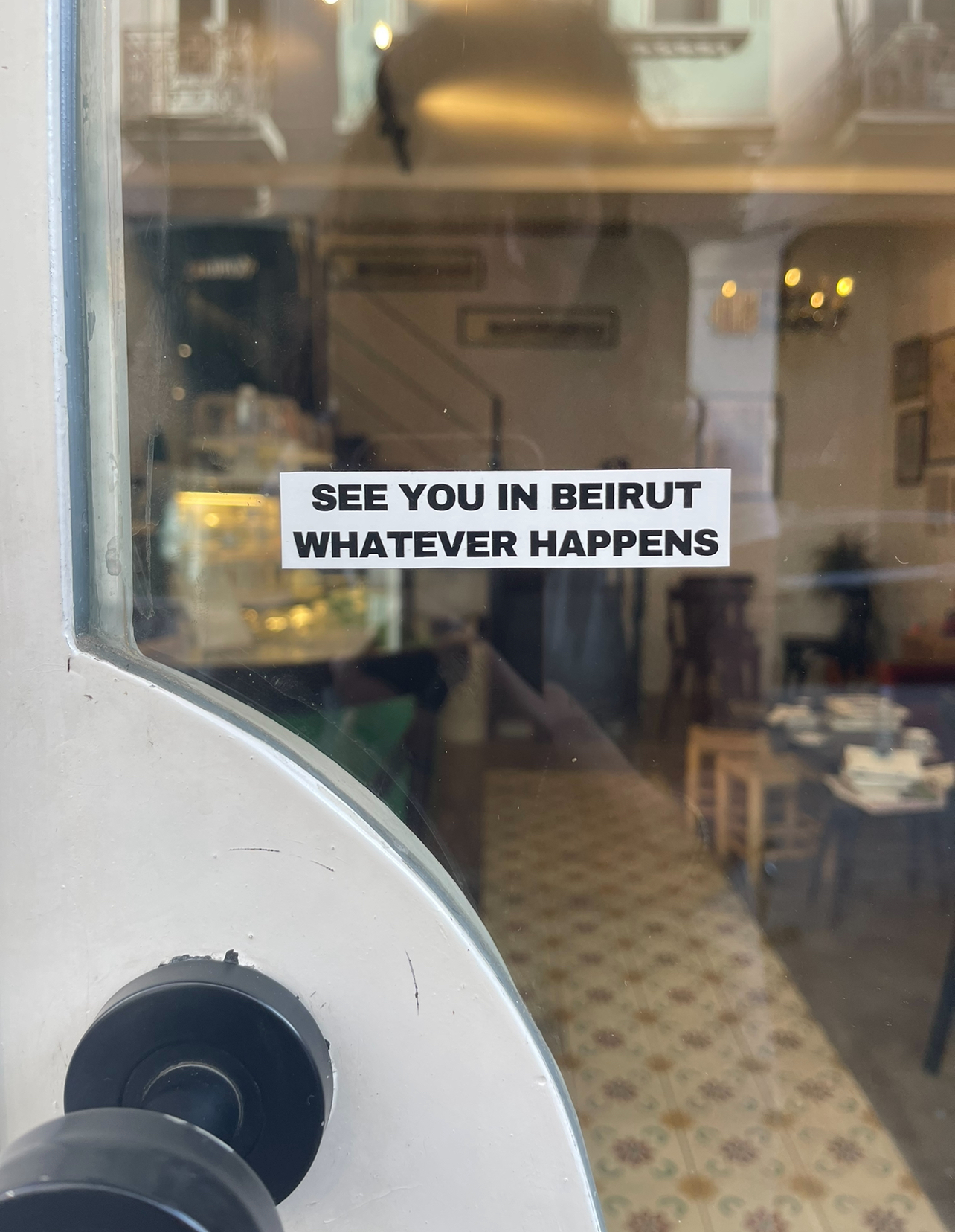 A note written on a restaurant window in Beirut.
A note written on a restaurant window in Beirut.
It’s as if someone gave us a glimpse of the future and we saw the final chapters of our parents’ stories. We understood that we’d carry the same burdens if we allowed this country to absorb us once more, so we chose to escape quickly before the hole that swallows us grew larger.
Our country refuses to embrace us. It swallows us whole, then spits us out, as we try to escape during the brief period of numbness before it tries to consume us again. As we flee, we try to reclaim what we once had in different ways: we search for a similar sun, we try to persuade a close friend to immigrate to our country of exile, we take our mothers' advice more seriously, or we pack a kilogram of Lebanese coffee in our ‘escape bag.’
Our country refuses to embrace us. It swallows us whole, then spits us out, as we try to escape during the brief period of numbness before it tries to consume us again.
As we flee, we try to reclaim what we once had in different ways: we search for a similar sun, we try to persuade a close friend to immigrate to our country of exile, we take our mothers' advice more seriously, or we pack a kilogram of Lebanese coffee in our ‘escape bag.’
I don’t know how to divide myself into separate parts just so I can be near them all, or how the final episode of my friends’ story of escape will end.
I don’t know if Lebanon will still be warm after we all escape.
* The views and opinions expressed in this article are those of the author’s and do not necessarily reflect the official policy or position of Raseef22
Raseef22 is a not for profit entity. Our focus is on quality journalism. Every contribution to the NasRaseef membership goes directly towards journalism production. We stand independent, not accepting corporate sponsorships, sponsored content or political funding.
Support our mission to keep Raseef22 available to all readers by clicking here!
Interested in writing with us? Check our pitch process here!
